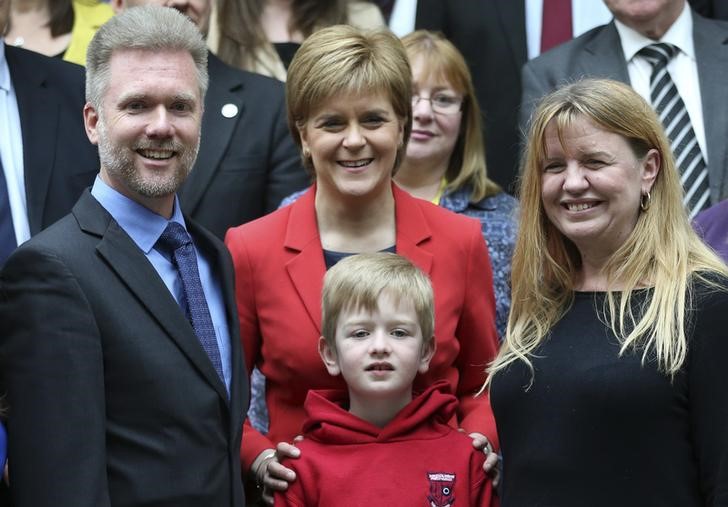By Elisabeth O'Leary
EDINBURGH (Reuters) - An Australian family facing deportation from the Scottish Highlands after a change in visa rules is now in limbo, waiting to hear from the British government whether they will be given more time to meet visa requirements.
Gregg and Kathryn Brain, who moved to Scotland in 2011 with their son Lachlan, are hoping for a job offer or a new extension to their visa after the last one expired at midnight on Monday.
Their case has attracted much sympathy in Scotland, where Kathryn Brain was previously given permission to study and then work as part of a now defunct British government-backed scheme to shore up the Highlands' ageing and shrinking population.
"This is simply about honouring the deal signed up to," Gregg Brain, a health and safety expert, told Reuters. "We signed up for a deal and built a life here, only to have the ground pulled out from under our feet."
Visa rules were changed in 2012 with an eye to addressing voter concerns on immigration in the United Kingdom as a whole. Immigration was at the centre of Britain's June vote to leave the European Union.
"(The Brains) simply don't know if there will be a knock on the door at some point and they will be removed," Ian Blackford, the lawmaker for Dingwall where the Brains live, told Reuters.
"If that is the route they (Britain's interior ministry) want to go down, well, we just don't know, we're in their hands," he said, adding that he had yet to receive a reply to two letters sent to British Immigration Minister Robert Goodwill's office in the last 24 hours.
A spokesman for the interior ministry said that any family that failed to comply with the regulations was expected to leave the country voluntarily.
"We have given (the Brains) three extensions on an exceptional basis over a number of months to allow them to try to secure a job that would allow them to meet the immigration rules, but this cannot be open-ended," the spokesman said.
"OVERWHELMING RESPONSE"
The Brains have settled in Dingwall, where Lachlan, 7, has learnt the ancient Scottish language Gaelic. The case attracted the attention of Scotland's First Minister Nicola Sturgeon, whose devolved government has no say on immigration but who made a personal appeal on the family's behalf in May.
Kathryn Brain, who studied Scottish history and has been seeking work as a curator, was offered what appeared to be visa-compliant work at a Highlands distillery earlier this year. But the offer was withdrawn in late July, giving the family little time to search for an alternative before the Aug. 1 deadline.
The Brains have moved house four times in as many months and have been supported by the generosity of mostly local benefactors because their latest visa extension did not include permission to work.
"The response has been overwhelming," said Gregg Brain. "One day Lachlan came home from school and in his bag was a blank envelope with 10 pounds ($13) in it. It makes me cry just thinking about it."
He describes his family as an example of successful immigration, qualified and integrated in a community where young families are needed to bolster the economy.
He joked that the intense interest in the case might serve as experience for a future in public relations in the legal sector.

"If there's an immigration law firm that wants to take me on as the face to represent their clients, I'd be more than happy, but at the moment you'll have to get past (immigration minister) Robert Goodwill."